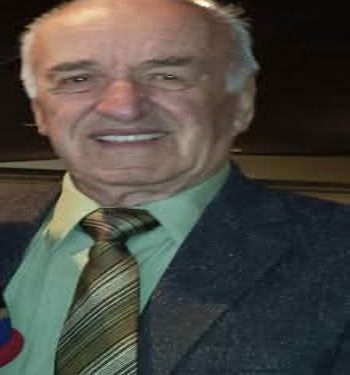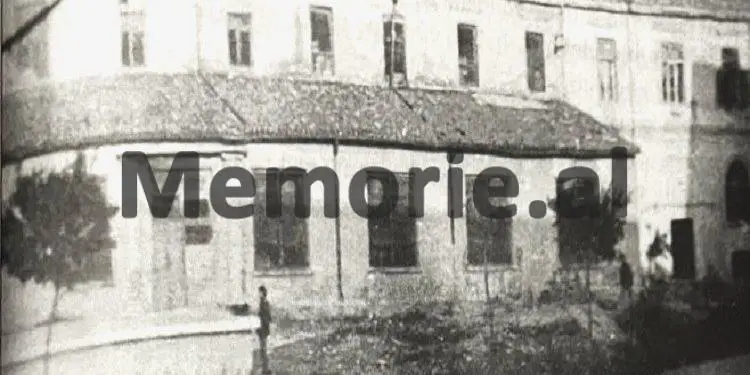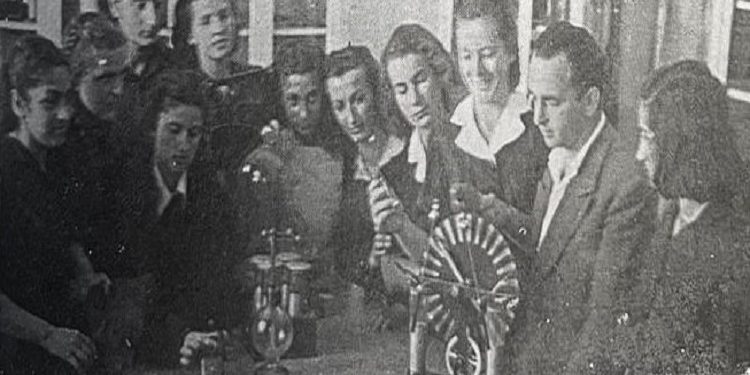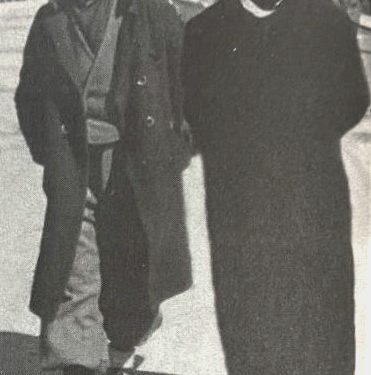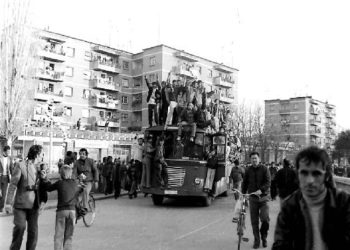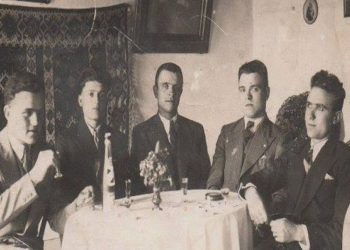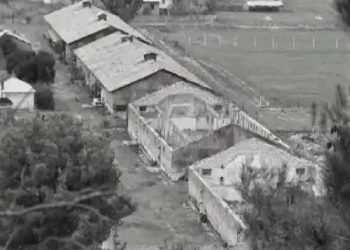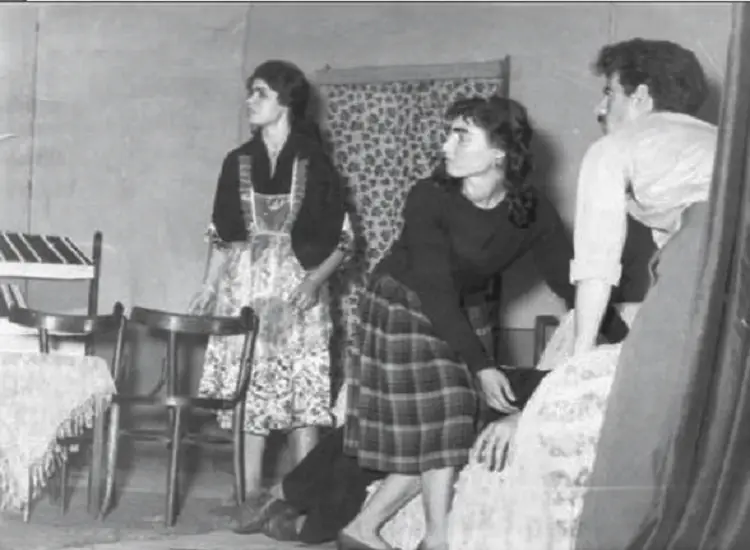By Ahmet Bushati
Part Four
Memorie.al/ After the flag was altered in 1944 with the addition of the communist star, Shkodra transformed into a center of resistance against the regime, paying a high price for its tradition of freedom. By April 1945, high school students, already feeling betrayed by the promises of the war, gathered to oppose the new terror that imprisoned and killed innocent people. Communism turned Kosovo into a province of Yugoslavia, while Shkodra was punished for its “historical crime”- its defiance against invaders. The “Postriba Movement” became a tool to suppress all dissent, plunging the city into an unprecedented spiral of suffering: imprisonments, executions, and the destruction of families. The high school students, alongside citizens, became symbols of resistance, while some “young communists” turned into tools of the State Security, leading to expulsions, imprisonments, and internments.
Four times, Shkodra rose in armed rebellion, but history forgot these battles. This book is written to remember the countless prisoners, the tortured, the killed, and the parents who suffered in silence. It is a warning against dictatorship and a plea for future generations not to forget the sacrifices made for freedom.
Continued from the previous issue
In the Footsteps of a Diary
Shkodra in the Early Years Under Communism
A chaotic vigil in Shkodra, opponents of the future regime flee!
Since October and throughout the entire month of November 1944, Shkodra, although without any visible accidents, was in fact experiencing a real state of chaos and anarchy. Until the partisan brigades had entered the city of Shkodra, it would have continued to seethe with large crowds of armed nationalists, gathered here in Shkodra from all parts of Albania, especially from the South, whose rifles still smelled of gunpowder, from the fratricidal war they had waged until the last days with their communists.
However, life in our city continued to flow somewhat calmly, as long as people continued to live as before, to dress well and fill the city’s cafes, and also to walk as always in their beloved square, while the market also continued to be full of goods and many buyers. All this happened in Shkodra at that time, despite the heavy political atmosphere, which was silently reflected in the conscience of every citizen.
It was that time and that situation when Shkodra would become a great station for all those who had linked their fate of leaving Albania with it, having in common all those men, the rifles and machine guns that they continued to carry on their shoulders, the sadness and dangers that they had left behind in their miserable homes, as well as the fate that “they” and “they” awaited. Excluding those to whom the harsh duty of war had worn the green uniform of a soldier over time, during those days one would constantly see people who, according to the characteristic clothing of the regions from which they came, presented a real mosaic of clothing, most notably the dark woolen ones of the painful Tosks, with their white caps on their heads.
The gendarmerie under the command of the legalist military men, Llesh Marashi and Shaban Elezit, continued to carry out its duty of maintaining order, just as before. There were other categories of police and gendarmes, such as those in dark clothes who were called Mato Murati, – after the name of their quaestor – who were anxiously, but without problems, prolonging the last days of their short careers. Another category of gendarmes would be those who were called Hasan Isufi, gathered from the villages of Anës e Malit, villages of Albanian jurisdiction that at that time extended to the outskirts of Ulcinj and Tivar. There were also Mirditas, who dressed in honey-colored military clothes, who now roamed the streets of the city in irregular groups, and who were called Gjonit Marka Gjonit. Finally, there were postrribas and small groups of other mountain people, as well as Dibra people, etc., who went behind the various heads.
The days passed quickly and chaotically, and it was believed by everyone that as such, they should be numbered. Everything around you would seem as if time had stopped in place and lost every bit of patience, which could explode from moment to moment. The serious and distraught looks of many of the commanders and various leaders, as well as their last loyalists who were leaving behind them, evoked feelings of pity and pain.
Seeing their sad faces like that, one suddenly thought of the final separation they must have had from their countries and their grieving families, thus evoking a certain respect and true pain for their fate, for the war they had fought, and perhaps even more, for its loss, and of course, still not knowing properly, what fate barbaric communism was in store for their families later on. Meanwhile, of course, there was a considerable mass of the people who, at the end of the war, expected to breathe freely, which, as is known, would never happen, because very soon the brightest hopes of the war would be drowned in massacre and tyranny.
In the last week of the war, they began to evacuate Shkodra in the most painful way. Some of them were leaving, retreating behind German convoys along Yugoslav territory, with numerous vicissitudes of war and under an exceptionally harsh winter. Others, including Mit’hat Frashëri, Sali Efendi Muftia, Hasan Dosti, etc., who, having trusted the old boats of Ulcinj, were able to cross the Adriatic, mined by the Allied forces, in an adventurous but successful way, and to emerge safe and sound on the free shores of Italy. After another day or two, following in their footsteps, another large group – but not having the same luck as their predecessors – would be blocked by the machine guns of the newly arrived partisan forces from the South, who, according to the Secret, had been stationed in time at those points where the two banks of the Buna River came closest to each other.
These unfortunates, who suddenly fell into the hands of the communist partisans, after a month or two, would be among the first victims of the infamous “People’s Trials”, ending in death by bullets or ropes, some of whom, if they were in one of the last two groups leaving Shkodra, would be the ones who took the difficult roads of Dukagjini, among whom was the brave man with the sword, Professor Alush Lleshanaku, in the hope of capturing Kosovo, but where it was said that in cooperation with the Kosovar brothers, they would realize that great resistance, which would make it possible to maintain a zone free from Serbian and communist jurisdiction, until the allies arrived there, according to the promise that the latter had made to them themselves through a mission in Kosovo, just a few days earlier.
There were many men who refused to leave Albania for reasons of age, as well as the mentality that “one should not leave one’s country”. There were others who did not leave Shkodër, convinced that the communists would not have it “long”, just as there were also brave men, like the Kazakhs and others, who would not leave it, as a duty they had set for themselves, to establish armed resistance in the country.
All those men who had left Albania on that occasion would never have the fortune to see their country again, and would remain for life in a foreign land with the memory of the longing and tears they had taken with them on that last day, when they were forever separated from the people and the land they had taken from them. How could they not have believed it before, that they, scattered all over the world as they were, would live out their lives, not only with the familiar longing of exiles, but also to suffer, along with the fate of their families, the torment of a deep disappointment, and, constantly inconsolable by fate, would one day close their eyes definitively in solitude.
Most of the nationalists who remained within the country would either be killed in the struggle by the forces of the “People’s Defense”, who for their part would pursue them relentlessly, or would be captured even by the betrayal of those who, like no one else, had entrusted their lives and honor to them, or-or, would be handed over on the occasion of the declaration of amnesty, to spend many years in prison, within which, many of them would die. It remains to be noted that in one of those turbulent days, under enigmatic circumstances, Sait Sekiniqi, one of the most charming boys within a circle of friends, generally university students, and one of the most active and enthusiastic of the nationalist youth of the National Front in Shkodra, would fall victim to time.
Thanks to the courage and sacrifice of some Italian prisoners, Shkodra was saved from a certain catastrophe!
The Germans, following their strategic retreat, for months on end, had brought a lot of ammunition to the meadow known in Shkodra as “Livadhi i Sylço begut”, which was located on the side of the “Perash” neighborhood, at the end of the hills of the “Draçin” neighborhood, from where the German army was then supplied with ammunition wherever it happened to be in the Balkans. The meadow in question, in addition to its large surface area, was surrounded by dense and developed willows and protected by German anti-aircraft guns, placed on top of the hills. Despite the occasional withdrawal of ammunition by the German army, the amount left there would always be very large. Its explosion on the day the Germans left, stood over the heads of the citizens of Shkodra, like the terrifying threat of an inevitable apocalypse.
On that occasion, to escape the possible danger, some families left the city and headed for nearby villages. The Germans, for their part, would also inform the population several times that when the ammunition was to be blown up, the doors and windows of all the houses in the city should be open and the people themselves should go out of them. The families of the houses around the meadow were informed in time by the Germans of the necessary abandonment of theirs, since their collapse would be certain. On the other hand, the Germans, out of pity for what would happen to Shkodra in the event of the explosion of the ammunition, invited the population to remove as much ammunition as possible from the meadow. Even though several citizens were daily taken away with ammunition, by means of a pickup truck or one of those large carts that at that time were called “sharabajka”, it must still be said that the quantity of them thrown into the Buna River was completely, completely negligible.
Eleven Italians had been shot, among whom was one named Conti and another named Bacherino, specialists of the former Italian genius, who since the capitulation of Italy had remained captive and in the service of the German army, there in the Meadow of Sylcho Bey, where all that ammunition had passed through their hands. They had always been the ones who had selected the ammunition at the time it was unloaded and who had arranged it, and later, under the supervision of the Germans, who had also mined it.
In the late hours of a dark night in the middle of the Nandori, the eleven Italians, with the help of Xhemil Bushati’s family – whose house happened to be next to the meadow – and directly through her son, Vehbia, who had known and been in contact with them for a long time, disappeared into the darkness of the night, finding the house of Hamit Bërdica, who would shelter them in the hay tower, where those Italians would remain for several days, locked up, with their commitment to decide, so that Shkodra, on the verge of danger, would be useful to it. After two or three days, in this same house, the family of Xhemil Bushati himself would also shelter them, after having abandoned their own, according to the Germans’ notification.
As the remaining days of the war passed and precisely on the last afternoon before the so-called “liberation”, that is, on November 28, 1944, the citizens of Shkodra saw with their own eyes that the Germans were abandoning the city, that they, with their motorized vehicles, were finally taking the road to Koplik. So, when night fell, all the people believed that there was no German left in the city, but of course, without forgetting for a moment, the ammunition mined there in the meadow of Sylço Bey.
That night, charged with fear and mystery, like the time before a storm, had caused the people, even in the absence of the Germans, out of fear, to lock themselves in their homes as before, at the appointed hour of “koprifuoko”. Likewise, that night, groups of young people, drawn from the “Neighborhood Councils”, would move like shadows everywhere through the dark streets of the city, and while the night, more silent and solemn than ever, was slowly approaching, no citizen of Shkodra could have imagined that at that very moment, the eleven Italians, locked up for two weeks in Hamit Bërdica’s house, had emerged from it like skunks from a cave, led by Vehbi Bushati, and without anyone noticing, would rush to the ammunition field, where the fate of all of Shkodra depended.
Convinced that the Germans would not leave Shkodra without first blowing up that ammunition, the Italians, without for a moment doubting the possibility of the presence of some Germans lurking somewhere at the entrance to the meadow, behind a large bush, left Vehbina as a guard, while they themselves, communicating with each other with signs and gestures, headed for the interior of the meadow.
The system of detonating the ammunition was complicated. It first extended through a network that crossed a good part of the perimeter of the meadow, before returning to its interior, where the large ammunition caches were located. The system in question was built so that the Germans, taking advantage of the long interval between the moment of the ammunition being ignited on the outskirts of the meadow and the explosion in the center, at the time of their departure from Shkodra, could get as far away from it as possible without suffering any casualties.
Thus, those Italians, certain that the Germans would not leave without detonating the ammunition – which, as their rule, should never fall into the hands of the enemy and, on the other hand, so that these Italians themselves would not be dictated to by them for the secret and dangerous work they were carrying out, did not touch the wires of the lateral network at all – where the ammunition had much less power than in the interior – but were engaged in severing the wires of the interior areas, which presented a high level of danger, thus ensuring that Shkodra was finally saved from a certain catastrophe, which the Germans themselves had predicted.
However, it cannot be said that Shkodra escaped unscathed on that occasion: it was not yet midnight when the entire city was greatly shaken by the explosion of that relatively small quantity of ammunition, which the Italian specialists had not touched, in order not to be discovered by the Germans. However, from the strong shock that occurred, the windows of many houses in the city were broken, the ceilings and roofs of several houses fell or were damaged, while those near the meadow, such as the large houses of the Bushatlij, collapsed completely.
Shortly after the explosion of the ammunition, Shkodra, not without shock, would hear three more incomprehensible explosions: German forces, deployed since the evening of that night somewhere between Shkodra and Koplik, perhaps somewhere around the village of Vrakë, had returned to Shkodra one of their tricycles, with the mission of blowing up the three bridges that connected the city with its outer roads, in order: that of Baçallek, Buna and Kiri.
I could tell you that after all of the above, in the end the whole city, somewhat relieved, fell asleep, but that nevertheless, without having slept peacefully again. So, it continued to be a night that I could not trust.
At around three o’clock in the morning, a German tricycle had entered with great speed and power from the “Rusit” side, on the road of the “Çakaj Quarter”, and just before it reached the hospital road, a man who at that moment had walked like a shadow along that narrow road and, quickly disappearing behind the door of a house opposite, had made the German believe that he had fallen into an ambush, and on that occasion he had thrown one of their powerful bombs, killing citizen Qamil Berberi, who had just come out of the door, to notice if there was anything suspicious around his house, inside which some partisans were staying, like in many other Shkodra houses that night. Along with Qamil, his mother, who had gone after her son, so as not to leave him alone, was also killed on that occasion. One of his sisters, who had also set out after her mother in search of her brother, had managed to escape, but not without receiving several serious injuries to her body.
During those days, people would also talk around the city about two other Italians, also former specialists of the Italian genius, who, thanks to their courage and human spirit, had cut off those dangerous wires that would blow up the hospital mined by the Germans, as well as the houses around it. The next day, when another mild and sunny day had set in, the citizens of Shkodra, driven by curiosity about the events of the previous night, as well as about the possible news of the new day, had left their homes early and gathered in groups in the neighborhood centers, where they would talk animatedly among themselves.
Without being able to tell what could have happened at the same time in the other neighborhoods of the city, in those of “Dudas” and “Kiras”, many familiar and unfamiliar faces of armed partisans were recognized and, precisely in that of Dudas, all those who happened to be on the street at that moment would be very surprised when they suddenly saw a German military vehicle with an officer inside.
To get there, that brave car had traveled, not without risk, the narrow and winding streets of the “Rus” and “Dërgu” neighborhoods, had passed as if in a parade through the “Dudas” neighborhood with its people and partisans, had entered an alley and finally stopped in front of a citizen’s house: they had not allowed that German officer to continue his journey with the army, without returning once again to the city of Shkodra, where he had to pay off a debt owed to the cook, named Met Matlia. Memorie.al




